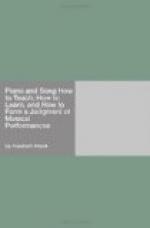6. Before you perform a piece, play a few suitable chords, and a few appropriate passages or scales up and down (but play no stupid trash, such as I have heard from many virtuosos), in order to try whether the condition of the instrument presents any unexpected difficulties. Try carefully also the unavoidable pedal. A creaking, rattling, grating pedal is a frightful annoyance; I wonder if the piano of “the future” is to suffer from this also. Chopin’s Funeral March, with obligato accompaniment of a squeaking pedal sentiment, even although the omissions and mistakes in the bass do not occur,—alas! who can describe the effect of this melancholy march?
7. I have written a special article on the manner of sitting at the piano, and I will refer you once more to that.
8. Use no mechanical aids in practising, not even the dumb key-board; although, with very careful use, that is not without value. Strength will come with time; do not try to hurry nature. The table is the best “dumb key-board,” as I have already explained. The “hand-guide” is also unnecessary: its value is compensated by its disadvantages.
9. Do not let your hearers crowd too near while you are playing. Do not play the same piece da capo. You may be justified in breaking off in the midst of a piece, if there is loud and continuous talking, &c.
I hope you will give me the honor of your company again at my soirees: I am no writer of comedies, but I can tell you a great deal that is interesting and amusing which I have myself experienced.
CHAPTER XIV.
EXTRAVAGANCES IN SINGING AND PIANO-PLAYING.
(An Evening Party at Mr. Gold’s.)
DRAMATIS PERSONAE.
MR. GOLD, the banker (fond of music).
MRS. GOLD (sings, and is an invalid.)
MR. SILVER, bookkeeper (formerly a singer with
Strauss).
MR. PIOUS, a friend of the family (a musical impostor,
and a hypocrite
generally).
MR. FORTE, a foreign piano virtuoso (of weak nerves).
DOMINIE, a piano-teacher.
EMMA, his daughter.
(Mrs. Gold has just been singing in the modern Italian manner; suddenly alternating exaggerated high and low tones, given in a jerking manner, with inaudible pianissimo_ in the throat, and quavering on every note, with many ornaments, and always a quarter of a tone too flat. She sang all the four verses of “Fondly I Think of Thee” by Krebs._)
DOMINIE. Will you not go on, Mrs. Gold? The piano is a little too high, and you are obliged to accustom yourself a little to it.
MRS. GOLD. I cannot sing any more. That beautiful song has taken such hold of me, and I feel so badly. (Whispers to Dominie.) Mr. Forte did not accompany me well, either: sometimes he did not come in right, and played too feebly; and sometimes he improvised too much in playing, and overpowered my voice, which is a little weak just now.




